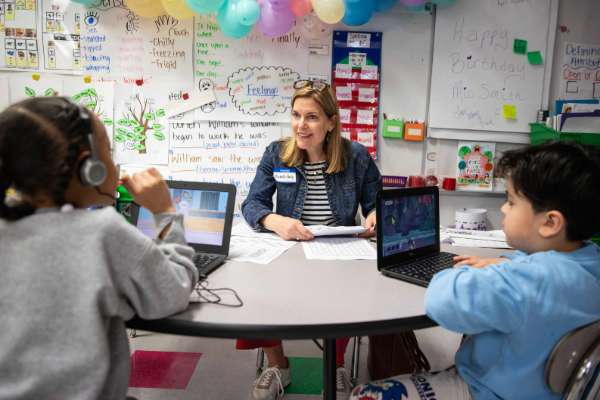Program Overview
Preparing professionals to support diverse learners through a flexible blend of online and in-person training.
Lipscomb's School Psychology program will prepare caring professionals who work collaboratively with educators, administrators, parents, and children to promote learning and development in general education students and for students with special needs. The mission of this program is to equip caring and competent individuals to assess, consult, and provide interventions to lift up educators, students, and families in P-12 learning environments. We aim to support the whole child in terms of learning and well-being.
The School Psychology EdS will primarily be synchronous-online but has hybrid elements, including intensives and required in-school practicum experiences. This allows you to participate in this program regardless of where you're located. The specialist level curriculum consists of 7-9 semesters of full or part-time study, which encompasses structured field experiences and at least 60 graduate semester hours or the equivalent.
This program is designed for individuals who have completed a Bachelors or Masters degree from an accredited institution of higher education. Lipscomb’s School Psychology EdS program will follow the National Association for School Psychology (NASP) model. The program will prepare individuals for licensure in the state of Tennessee. Out-of-state candidates should check with their state for licensure and reciprocity information.
Admissions Requirements
Candidates seeking admission to the EdS in School Psychology must meet the following criteria:
- Applicants must list all institutions attended and submit official transcripts from every institution, including any college-level credit earned. Transcripts from only the final or degree-granting institution are not sufficient.
- If seeking transfer credit, only EdS or doctoral degrees will be considered for up to 6 total credit hours
- Three letters of recommendation (including a professional recommendation)
- A personal statement on your journey of faith and spiritual development
- Purpose Statement for pursuing Ed.S. in School Psychology
- Current resume
- Writing assessment
- Evidence of a bachelor’s degree or higher from a regionally accredited IHE.
- Applicants who do not hold a master's degree are required to submit GRE scores as part of the application process.
- A minimum overall GPA of 3.00 from a completed baccalaureate or post baccalaureate degree program or a GPA of 3.00 in the most recent sixty (60) credit hours earned at a regionally accredited IHE.© a fingerprint sample and submit to a criminal history records check to be conducted by the Tennessee Bureau of Investigation (TBI) and the Federal Bureau of Investigation (FBI) in accordance with T.C.A. § 49-5- 5610. If the background check reveals a charge that could jeopardize licensure, the candidate may not move forward in the admissions process.
- Provide at least 2 recommendations from professional and academic sources; one reference must come from the most recent supervisor, documenting non-academic dispositions.
- Interviewed by a team of faculty and school psychologists prior to formal admission to the program.
Courses
Tuition & Aid
- $953* per credit hour
- $715 per credit hour with the 25% tuition discount
- *Note: The graduate tuition rates may increase annually, effective each summer semester.
- For more information about Project Inspire, please contact Ronda Hammond at ronda.hammond [at] lipscomb.edu (ronda[dot]hammond[at]lipscomb[dot]edu).
- Learn more about Project RAISE to see if your school district qualifies for tuition assistance.
Student to faculty ratio
Our Faculty
Career Paths
School Psychologist in P-12 schools
A school psychologist plays a crucial role in the educational environment by addressing the mental health and emotional well-being of students, providing direct support to students through counseling and intervention strategies. They also engage in preventive measures by promoting mental health awareness and providing training for staff and parents.
Contract School Psychologist
A contract school psychologist plays a vital role in the educational system by providing psychological services to students on a contractual basis, and working collaboratively with teachers, parents, and school administrators to identify student needs and develop appropriate intervention strategies.
MTSS
A multi-tiered system of support in schools serves to provide varying levels of assistance to students based on their individual needs. Being part of the multi-tiered system fosters collaboration among educators to identify and address academic or behavioral challenges through a structured approach.




